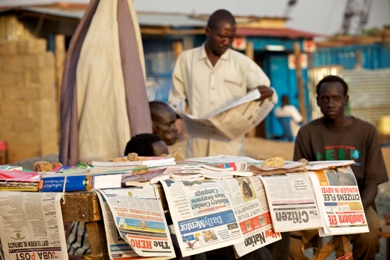S. Sudan’s crack down on media draws condemnations
August 7, 2015 (JUBA) – South Sudan government has come under series of criticism for recent crackdown on independent media houses, with the European Union (EU) urging authorities to conform to international standards on freedom of the press.

“Free, diverse and independent media constitute one of the cornerstones of a democratic society by facilitating the free flow of information and ideas, and by ensuring transparency and accountability,” the press statement partly reads.
“We urge the Authorities of the Republic of South Sudan to guarantee the exercise of these freedoms in conformity with international standards,” the European diplomats added.
South Sudanese security agents ordered closure of independent daily Citizen Newspaper on Tuesday and locked offices of Free Voice, a media non-governmental organization whose compound also hosts the Voice of America (VOA). There was no explanation given.
Nhial Bol, the editor in chief of the Citizen Newspaper said security officers showed him a letter ordering the closure of his paper for an opinion that challenged the government’s commitment to end the war through dialogue.
The Committee to Project Journalists said South Sudan’s press has been constrained since this conflict began and the latest action was also unacceptable.
“Now authorities seem to be ratcheting up the pressure,” said CPJ East Africa Representative, Tom Rhodes, in a statement extended to Sudan Tribune on Friday.
“We call on the government in Juba to reopen these news outlets and allow all journalists to freely carry out their duties,” said Rhodes.
SPLM LOSING GLORY
South Sudan’s opposition political parties equally condemned the action of government’s agent. The People Liberal Party (PLP) said the ruling SPLM party was restricting the freedoms it fought for more than two decades.
“Where is the freedom we fought for if there is no inclusive platform for all citizens to voice their concern? Why [do the government restrict] freedom of expression to only those glorifying the government while oppressing oppositions,” said Peter Mayen Majongdit, the interim leader of PLP.
Majongdit cited constitutional provisions that guarantee freedom of the press and freedom of expression including the Media Act Chapter 1(3) that “guarantee the independence of the services” and chapter 2(6) which says all media houses “shall serve the interests of all South Sudanese and shall carry out its duties, enjoy operational and administrative autonomy.”
“A successful government is a government that listens to criticism of its citizen, the government should provide an inclusive platform for all views, for those who glorify the government as well as those who criticize the government,” he said.
The main opposition party, the SPLM for Democratic Change (SPLM-DC) said the government was narrowing other avenues for the opposition.
“It is very clear now that the government is getting repressive. It is lacking confidence in itself and this is why it is resorting on all the avenues of other point view. It is closing the media because the media can allow other point of view to be expressed,” said Lam Akol, the chairman of SPLM-DC.
The government has declined to explain the reason for closing the media offices and ordering halt to printing of the Citizens newspaper.
(ST)
